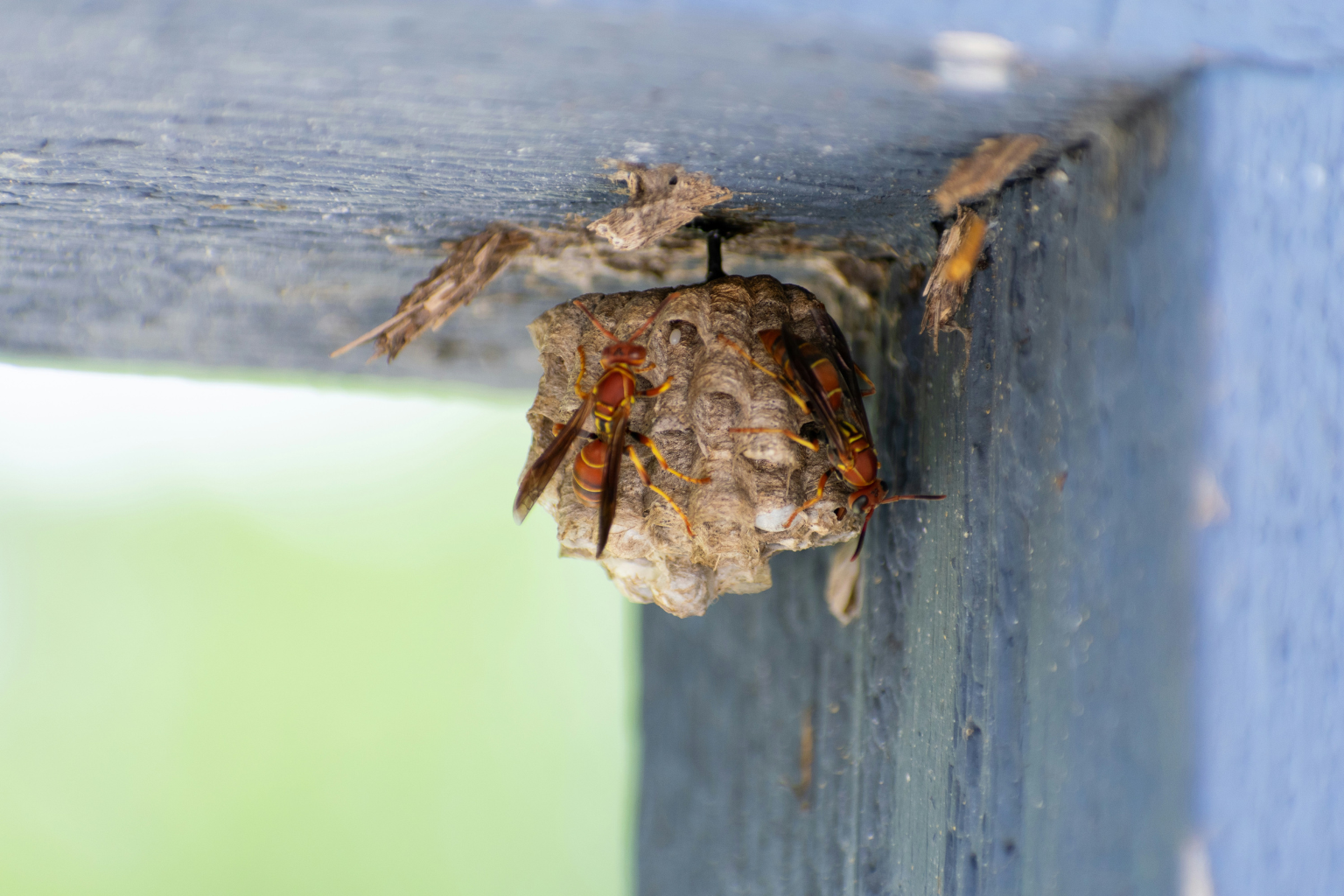

Summer is one of the best times to settle into a new home however, with the bright sun and lush gardens comes some unwelcome guests too - wasps. For first-time homeowners, it's important to know that wasps are more than just a nuisance, they can also be dangerous especially when it comes to children, pets or anyone with an allergy. With this in mind, wasp nest prevention is essential for control and protection.
Once a wasp colony settles in, removal can be costly and hazardous so understanding how to prevent wasp nests before they show up is one of the smartest steps a first time homeowner can take. As experts in pest prevention and removal, we’ll take a look at the risks, the attractors, and the strategies that work in wasp nest prevention - from simple household checks to professional prevention plans.
Let’s dive right in.
What Attracts Wasps to Your Home and Yard?
In order to successfully stop wasps from nesting on your property, it’s important to understand what can draw them to your property in the first place. When it comes to these pesky pests, it's important to remember that wasps are opportunistic and they seek out locations that offer reliable access to food, water, and safe shelter for nest-building. So, what attracts wasps to your home or yard?
- Food Sources: Wasps are attracted to sweet liquids, rotting fruit, sugary drinks, and protein-rich scraps like meat or pet food. With this in mind, your outdoor bins, compost heaps, unwashed dishes, and bird feeders can turn your home into a wasp banquet.
- Shelter: Wasps are always on the look out for secure, dry spaces to build their nests. Common locations you may find wasp nests include roof eaves, attic corners, garden sheds, wall voids, and under porches or decking. But don’t forget that even cracks in brickwork or gaps in wood panelling are also perfect entry points for these tiny insects.
- Landscaping and Clutter: A cluttered yard offers wasps ample nesting spots. Overgrown shrubs, woodpiles, and decorative garden structures all work to conceal early-stage nests. Water sources such as bird baths or dripping taps further make the space appealing.
By eliminating or monitoring these attractors, you reduce the likelihood of wasps seeing your home as a potential nesting site.
How to Seal Your Home to Prevent Wasps from Building Nests
A sealed home is one of the most effective long-term defences against wasps. New homeowners should make sealing their home part of their seasonal maintenance routine. But what does this entail?
- Inspect for Gaps and Cracks: Begin sealing your home by conducting a perimeter check around your property. Be on the look out for small holes, cracks in the exterior walls, gaps in the siding, and spaces around utility pipes. Wasps can squeeze through surprisingly small openings to build nests inside wall cavities or loft spaces.
- Secure Doors, Windows, and Vents: Ensure windows and doors close tightly and are fitted with screens in good condition. Any broken seals or gaps should be addressed with weatherstripping or caulk. It is also important to note that vents should be covered with fine mesh to allow airflow while blocking insects.
- Close Off Roof and Chimney Openings: Chimneys and roof entries are common entry points for wasps. Install chimney caps, repair missing roof tiles, and seal openings in the eaves. These actions not only deter wasps but also help improve energy efficiency and reduce other pest risks.
How to Maintain a Wasp-Free Yard
Yards are just as attractive to wasps as your home and this is why r outdoor maintenance goes a long way in protecting your space from wasp nests.
- Trim Trees and Shrubs: Wasps often build nests in dense branches or hollow tree limbs. Keep bushes trimmed, remove dead wood, and prune back trees to reduce potential hiding spots.
- Manage Waste Effectively: Garbage bins should always have secure, tight-fitting lids. Avoid leaving bins open during summer heat and empty them regularly. If you compost, keep it covered and far from the main structure of your home.
- Remove Existing Nests Early: Wasps typically start building nests in spring. If you spot a small early-stage nest (the size of a golf ball or smaller), it is best to contact professional wasp nest removers.
- Set Up Wasp Traps: Commercial wasp traps or DIY versions using sugar water can help catch scout wasps before they alert the colony. Place these traps around the perimeter of your yard, especially near outdoor eating areas.
Natural Solutions to Prevent Wasp Nests
If you prefer a proactive and natural strategy, you can incorporate repellents and deterrents.
- Natural Wasp Repellents: Wasps are known to dislike certain scents. Peppermint oil, eucalyptus oil, citronella, and clove oil are all natural deterrents. Mix a few drops with water in a spray bottle and apply to high-risk areas like eaves, window frames, and porch roofs.
- Fake Nests: Wasps are territorial. Hanging a decoy nest can trick them into thinking the area is already claimed. These are inexpensive, widely available, and safe to use around pets and children.
- Professional Pest Prevention: For complete peace of mind, especially during peak summer months, professional pest control services can apply long-lasting, targeted deterrents. At Excel Pest Services, our preventative treatments are environmentally responsible and designed to keep wasps out without impacting your garden’s natural balance.
How to Deal with Existing Wasp Nests Without Risk
Despite your best efforts, you may come across an active wasp nest. If this is the case, here’s how to handle the situation safely.
- Don’t Disturb the Nest: Wasps are highly defensive and may attack in swarms if they perceive a threat. Loud noises, vibration, or direct disturbance can provoke a dangerous response.
- Keep Children and Pets Away: Restrict access to the area. Wasps are fast and unpredictable, and young children or pets are more likely to get stung if they accidentally wander too close.
- Call a Professional: Never attempt to remove a nest yourself. Wasp nest removal is best left to trained pest control experts equipped with the right gear and treatments. Excel’s wasp removal specialists conduct a full assessment, treat the area, and advise on how to prevent future issues.
Stay Proactive and Wasp-Free This Summer
For new homeowners, summer is about making memories and certainly not about running from wasps. Preventing wasp nests starts with knowing what attracts them, taking the right steps to seal your home, and maintaining a tidy, low-risk outdoor space.
Stay one step ahead of nature by being proactive, consistent, and informed. And when in doubt, call in the experts.
At Excel Pest Services, we’ve built our reputation on safe, environmentally responsible, and highly effective pest control. Whether you need a one-off treatment or a year-round prevention plan, we’re here to help you enjoy your home.
Learn more about our proven wasp control services here.



